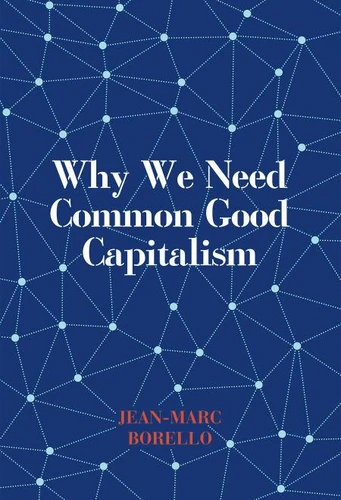Sens
Why we need common good capitalism
Par : Formats :
Disponible dans votre compte client Decitre ou Furet du Nord dès validation de votre commande. Le format Multi-format est :
- Pour les liseuses autres que Vivlio, vous devez utiliser le logiciel Adobe Digital Edition. Non compatible avec la lecture sur les liseuses Kindle, Remarkable et Sony
 , qui est-ce ?
, qui est-ce ?Notre partenaire de plateforme de lecture numérique où vous retrouverez l'ensemble de vos ebooks gratuitement
Pour en savoir plus sur nos ebooks, consultez notre aide en ligne ici
- Nombre de pages191
- FormatMulti-format
- ISBN978-2-37509-535-5
- EAN9782375095355
- Date de parution16/05/2018
- Protection num.pas de protection
- Infos supplémentairesMulti-Format
- ÉditeurDébats Publics
Résumé
Why We Need Common Good Capitalism
Capitalism leads to excesses and the social and solidarity economy can't provide all the answers. That's why we need a new economic model. As head of the French nonpro t GROUPE SOS, Jean-Marc Borello has shown that business is about more than getting a return on capital but also that anyone concerned about the common good needs to know how the economy works. That's the message he tries to get across when he travels the world.
It's the thinking that underpins the MOUVES (Mouvement des Entrepreneurs Sociaux, Movement of Social Entrepreneurs), a body that he set up in France in 2010. GROUPE SOS, which now employs 15, 000 sta and incorporates 405 structures, is impressive in many ways. It has become a large organization: it has a presence in 35 countries, provides services to a million people in France every year and its turnover is 900 million euros.
It has led the way in showing why performance is relevant to the nonpro t sector. Finally, it does not hesitate to outline aims that are straightforward to articulate but tough to deliver. It quite simply seeks to provide solutions to our most pressing social questions when it comes to youth, employment, welfare, health and seniors... In this book, Jean-Marc Borello pulls no punches. He argues that the social and solidarity economy must keep evolving, fully embrace its role as an economic actor and be bold when tackling issues, however di cult they may be.
He believes those working in it need to think outside the box, grasp the signi cance of the challenges we face and take ownership of a new approach: common good capitalism.
It's the thinking that underpins the MOUVES (Mouvement des Entrepreneurs Sociaux, Movement of Social Entrepreneurs), a body that he set up in France in 2010. GROUPE SOS, which now employs 15, 000 sta and incorporates 405 structures, is impressive in many ways. It has become a large organization: it has a presence in 35 countries, provides services to a million people in France every year and its turnover is 900 million euros.
It has led the way in showing why performance is relevant to the nonpro t sector. Finally, it does not hesitate to outline aims that are straightforward to articulate but tough to deliver. It quite simply seeks to provide solutions to our most pressing social questions when it comes to youth, employment, welfare, health and seniors... In this book, Jean-Marc Borello pulls no punches. He argues that the social and solidarity economy must keep evolving, fully embrace its role as an economic actor and be bold when tackling issues, however di cult they may be.
He believes those working in it need to think outside the box, grasp the signi cance of the challenges we face and take ownership of a new approach: common good capitalism.
Why We Need Common Good Capitalism
Capitalism leads to excesses and the social and solidarity economy can't provide all the answers. That's why we need a new economic model. As head of the French nonpro t GROUPE SOS, Jean-Marc Borello has shown that business is about more than getting a return on capital but also that anyone concerned about the common good needs to know how the economy works. That's the message he tries to get across when he travels the world.
It's the thinking that underpins the MOUVES (Mouvement des Entrepreneurs Sociaux, Movement of Social Entrepreneurs), a body that he set up in France in 2010. GROUPE SOS, which now employs 15, 000 sta and incorporates 405 structures, is impressive in many ways. It has become a large organization: it has a presence in 35 countries, provides services to a million people in France every year and its turnover is 900 million euros.
It has led the way in showing why performance is relevant to the nonpro t sector. Finally, it does not hesitate to outline aims that are straightforward to articulate but tough to deliver. It quite simply seeks to provide solutions to our most pressing social questions when it comes to youth, employment, welfare, health and seniors... In this book, Jean-Marc Borello pulls no punches. He argues that the social and solidarity economy must keep evolving, fully embrace its role as an economic actor and be bold when tackling issues, however di cult they may be.
He believes those working in it need to think outside the box, grasp the signi cance of the challenges we face and take ownership of a new approach: common good capitalism.
It's the thinking that underpins the MOUVES (Mouvement des Entrepreneurs Sociaux, Movement of Social Entrepreneurs), a body that he set up in France in 2010. GROUPE SOS, which now employs 15, 000 sta and incorporates 405 structures, is impressive in many ways. It has become a large organization: it has a presence in 35 countries, provides services to a million people in France every year and its turnover is 900 million euros.
It has led the way in showing why performance is relevant to the nonpro t sector. Finally, it does not hesitate to outline aims that are straightforward to articulate but tough to deliver. It quite simply seeks to provide solutions to our most pressing social questions when it comes to youth, employment, welfare, health and seniors... In this book, Jean-Marc Borello pulls no punches. He argues that the social and solidarity economy must keep evolving, fully embrace its role as an economic actor and be bold when tackling issues, however di cult they may be.
He believes those working in it need to think outside the box, grasp the signi cance of the challenges we face and take ownership of a new approach: common good capitalism.












